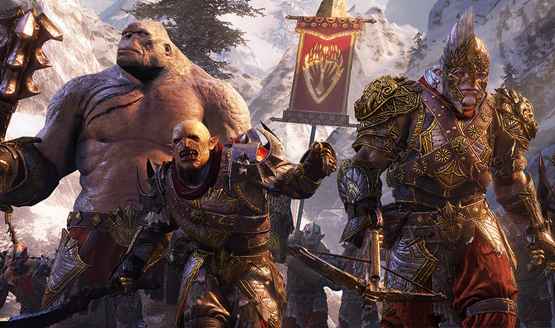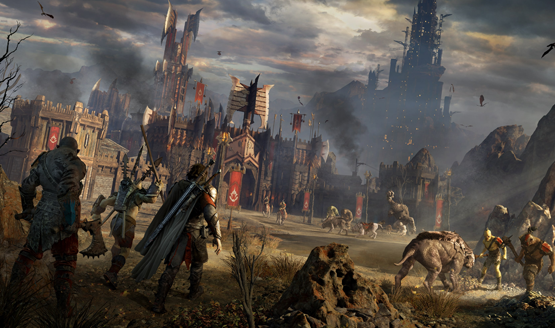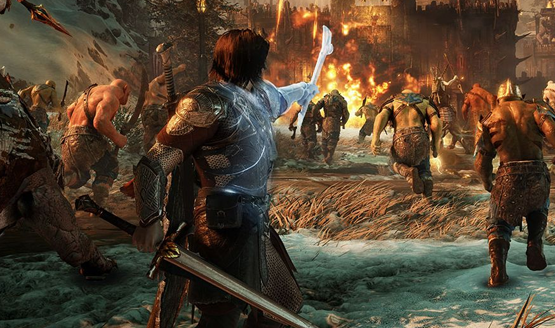Middle-earth: Shadow of Mordor introduced a brilliant new mechanic to games that blended strategy with open world action, creating an ecosystem and hierarchy of orcs in the world that build on your encounters and interactions. Shadow of War expands on the foundations laid by the first game, creating a fascinating strategy game of managing armies of orcs across five different regions. Our review thought very highly of it, recanting tales of deep-seated grudges that transcend life itself.
In most games, avoiding death is the goal, yet death remains more or less meaningless. Perhaps it’s nothing more than a couple minutes of wasted time as you go from checkpoint to checkpoint, or just attempting to retry an encounter, but it rarely has real implications on the game and the world. Shadow of War creates meaning from death, spinning an interesting narrative that persists even as Talion finds himself impaled on a pike or has his head crushed by a hammer. The Gravewalker always returns and the ecosystem of Mordor moves forward. The orc that killed you grows in power, and the balance shifts.
One of my favorite strategy series is XCOM. Those are games that taught me to get over my perfectionist attitude of completing every encounter perfectly and to accept the narrow victories. It even taught me to accept defeat and failure sometimes, hard as that might be. It’s nigh impossible to get through an XCOM campaign without losing well-loved soldiers, but the taste of victory is so much sweeter when the odds are monumentally stacked against me. That feeling of risk and permanently losing an army I’d spent hours carefully cultivating is part of the thrill that makes XCOM such a great strategy title.
That same thrill can be felt in Middle-earth: Shadow of War. Each and every encounter with an orc captain is a nail biting game of wondering how this experience will tip the scales in the region. I’ve even had orcs cross regions to hunt me down and get revenge for leaving them to die, betraying me, upsetting the balance in both the region they came from and the region they traveled to. Ambushes lie in wait. I’ve marked enemy captains, intending to hunt them down, only to have them find me instead. Caught unprepared, I’m suddenly pitted with the decision of running and allowing the captain to become stronger, or staying to fight and potentially die. Sometimes this ambush happens when I’m already engaged with another captain, so the situation becomes much more difficult than I had anticipated.
Embracing Difficulty
Nemesis Difficulty is aptly named after the very system that makes Shadow of War such a special game. Starting out on Normal, by experience with the first game meant I was easily overcoming challenges, and less than two hours in, I made the decision to raise the difficulty. “Death is certain,” the description says. Suddenly my power fantasy was cut down. I could barely move within Mordor without my actions being noticed by some threat. Captains were harder to conquer and more frequently did the unpredictable. I died. A lot.
My own orcs would betray me, and that sneering grin that was once the crown jewel of my own army would assault me while I tried desperately to shame another captain to a low enough level that I could recruit him. Now he’s immune to arrows and he’s adapted to my vaulting over him. He’s weak to stealth, but I’m already embroiled in combat and there’s somewhere close to what seems like 64,000 orcs surrounding me. Even if he’s broken, I can’t capture him fast enough without getting hit by something else. I can try to kill him, losing a powerful ally, or I can run, allowing him to level up and cause more problems next time. I could stay and fight, but it’s almost certain that death will follow.
It’s a mental dialogue that runs over the course of split seconds in Shadow of War. Strategy that needs to happen in the midst of battle. Subtle adjustments that need to be made upon discovering a captain’s weaknesses–or lack thereof. Are my skills set out right? What about my gear? Do I use the poison cloud or attempt to lure the group to an exploding barrel of grog? If I’m fighting multiple captains, is it worth summoning my caragor when one of them gets enraged by the beasts? Nemesis difficulty keeps me constantly on edge while running through Mordor, earning its name. Nemesis difficulty brings out the best in the Nemesis System.
Embracing Failure
Making death meaningful somehow makes death more bearable. You’d think with implications like Shadow of War has on death would prompt one to try to avoid it even more, but I embraced each death. Sad as it was to be felled by an orc blade (or arrow, or pike, or hammer, or stabby-chain thing), I was eager to see how the balance of the world shifted in favor of the orcs. I was excited to witness a grunt become a captain and be given a new title and armor to go along with the promotion. I was curious to know which death defying orc would come back from the grave with an ax in his head to haunt me after I had failed to save him during a massive battle.
The ebb and flow for control of Mordor is a strategy game best experienced when you embrace failure alongside success. Watching my own longtime nemesis rise to the position of overlord was a cruel and bitter moment. That bastard Ukbuk was out of my grasp, tucked away inside his throne room, but it made the moment that I cut off his head so much more satisfying. This wasn’t some random overlord. I wasn’t just ticking another gameplay box. I was killing Ukbuk, my onetime crown jewel turned unique nemesis that had made life in Mordor so difficult for me.
If you just want to play another open-world action game set in the world of Lord of the Rings, go ahead and select Easy or Normal. If you want to craft your own story and really get the most out of the unique strategies and gameplay systems that Middle-earth: Shadow of War has to offer, I urge you to play on Nemesis and accept each failure as a stepping stone to making victory taste that much more sweet.








